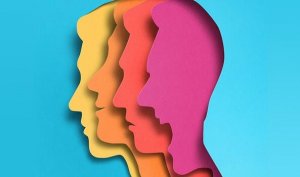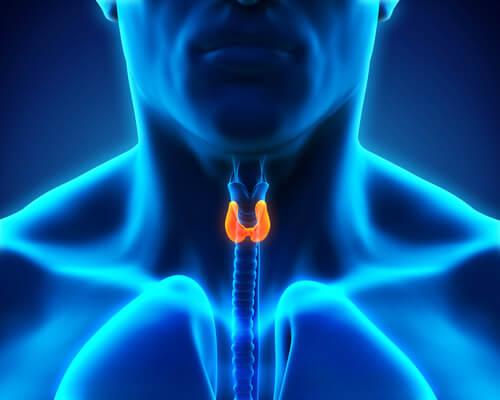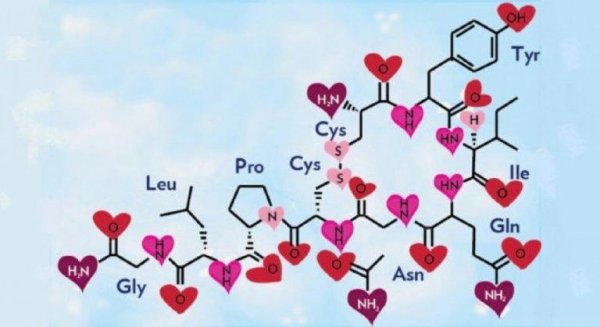6 Types of Hormones and the Moods that Go with Each


Written and verified by the psychologist Valeria Sabater
The different types of hormones in our body do more than just perform vital functions in certain biological processes. Whether we like it or not, they also condition our behavior and even our mood. A hormonal imbalance can lead to depression or change our entire worldview.
We all like to think that we have full control over our behavior and thoughts. However, we are completely subordinated to that tiny, powerful, and sometimes chaotic universe that is our hormones.
They’re protein messengers responsible for regulating all kinds of metabolic processes. They also permeate our brain, mediating our behavior and even the kind of thoughts we have.
Hormones are our body’s chemical messengers. They travel through the bloodstream to tissues and organs, managing our development, our internal balance and our well-being. However, any small changes can have an impact on our health and behavior.
It may seem frustrating or disturbing to not have total control over your mood. However, we must bear in mind that many of these hormonal imbalances can be regulated with a healthy lifestyle. Eating right, exercising, managing stress and getting regular check-ups are so important.
Many people see changes in their mood, like feeling helplessness or apathetic, and are unaware that it’s from a thyroid issue, for example. These issues often have to do with hormones and can be treated, either with drugs or lifestyle changes.

Types of hormones and their associated moods
Carla is 35 years old and just had her first child. She has built a successful career and has a good position in her company. Everything in her life went perfectly until she gave birth to her baby. Then something unexpected happened. She couldn’t get herself out of bed or even hold her daughter. She couldn’t handle this new stage of life.
Carla suffers from postpartum depression, in addition to hypothyroidism. She didn’t choose to feel like this. She is not a bad mother and she has not given up. This simple but common example shows how certain hormone imbalances can greatly impact our behavior, emotions, and thoughts.
Now let’s look at the primary hormones that orchestrate our behavior and mood.
1. Cortisol
As we all know, cortisol is the hormone that mediates stress and anxiety. However, just having it in our body doesn’t mean that we will necessarily lose control or feel on alert. The key is in the amount that is released.
Cortisol is a glucocorticoid hormone synthesized by glands on our kidneys out of cholesterol. It gives us energy to get up in the morning and go about our day. It also helps us react to situations that our brain interprets as dangerous.
Now, the problem with this hormone is that we are constantly secreting it. Especially when we feel like we are drowning in problems, when life gets too demanding and everything seems to get out of control…
For Carla, science has already been able to demonstrate that women who have high cortisol in their blood at the 25 weeks of gestation are at greater risk of postpartum depression.
2. Oxytocin
Oxytocin is a “multipurpose” hormone. The nine amino acids that make up this oligopeptide play a positive role in prosocial behaviors. These include relationships, sexuality, friendship, affection, parenting, breastfeeding, etc.
Now, a drop in oxytocin can cause depression, sadness, helplessness and a lack of empathy. A paper published in one of the British Society of Endocrinology’s annual conferences proved that people with a low level of oxytocin show less empathy.

3. Melatonin
Melatonin has always been a popular hormone to study. We know that it plays a role in our sleep-wake cycles. However, recently we’ve seen that it also slows premature aging and acts as a neurological protector.
- The pineal gland produces melatonin, or N-acetyl-5-methoxy tryptamine, out of tryptophan. Proper melatonin levels help us sleep and synchronizes our neurotransmitters.
- A deficiency doesn’t just contribute to insomnia but also weakens several cognitive processes, like attention and memory. It even puts us at higher risk of neurodegenerative diseases.
4. Thyroid hormones
Thyroid hormones are macromolecules and keeping them in balance is crucial for health and happiness. They play into in practically all the metabolic and functional processes of our body. The thyroid hormones T1, T2, T3, T4, TSH play an indispensable role in the endocrine system.
For the thyroid to perform its work with harmony and precision, it needs raw materials. These include iodine and vitamin B 12. Interestingly, these are two elements that we don’t eat a lot of in the West.
5. Adrenaline
Anxiety is a monster that feeds on adrenaline. However, is this hormone really so bad? Not at all. It is a versatile substance, just like dopamine and oxytocin.
- Adrenaline has a huge impact on our behavior. It activates our survival instinct, motivates us, and helps us be productive at work or in sports.
- Excess adrenaline may contribute to anxiety. However, an adrenaline deficiency may cause depression, low motivation, apathy, indecision, and more.
6. Endorphins
Endorphins are one of our favorite hormones. There are about 20 types of endorphins in the human body. They are in several areas, mostly in the pituitary gland, but also in other parts of the brain and nervous system.
These chemical compounds interact with opioid receptors to reduce our perception of pain. It acts in much the same way as morphine and codeine. Also, a flood of endorphins feels wonderful; it produces euphoria. It usually happens when we do things our brain considers “positive,” like sports, friendship, food, and sex.

There are many other hormones that affect our mood, such as progesterone, testosterone and catecholamines. However, the ones we talked about here are the most common. They are the ones that are easy to get out of balance, so we need to watch our habits and be aware.
Finally, if you notice mood changes or something off, whether physically or behaviorally (fatigue, apathy, sudden loss of energy), don’t hesitate; see your doctor. There are treatments for hormonal problems that can give you back the reins of your life.
The different types of hormones in our body do more than just perform vital functions in certain biological processes. Whether we like it or not, they also condition our behavior and even our mood. A hormonal imbalance can lead to depression or change our entire worldview.
We all like to think that we have full control over our behavior and thoughts. However, we are completely subordinated to that tiny, powerful, and sometimes chaotic universe that is our hormones.
They’re protein messengers responsible for regulating all kinds of metabolic processes. They also permeate our brain, mediating our behavior and even the kind of thoughts we have.
Hormones are our body’s chemical messengers. They travel through the bloodstream to tissues and organs, managing our development, our internal balance and our well-being. However, any small changes can have an impact on our health and behavior.
It may seem frustrating or disturbing to not have total control over your mood. However, we must bear in mind that many of these hormonal imbalances can be regulated with a healthy lifestyle. Eating right, exercising, managing stress and getting regular check-ups are so important.
Many people see changes in their mood, like feeling helplessness or apathetic, and are unaware that it’s from a thyroid issue, for example. These issues often have to do with hormones and can be treated, either with drugs or lifestyle changes.

Types of hormones and their associated moods
Carla is 35 years old and just had her first child. She has built a successful career and has a good position in her company. Everything in her life went perfectly until she gave birth to her baby. Then something unexpected happened. She couldn’t get herself out of bed or even hold her daughter. She couldn’t handle this new stage of life.
Carla suffers from postpartum depression, in addition to hypothyroidism. She didn’t choose to feel like this. She is not a bad mother and she has not given up. This simple but common example shows how certain hormone imbalances can greatly impact our behavior, emotions, and thoughts.
Now let’s look at the primary hormones that orchestrate our behavior and mood.
1. Cortisol
As we all know, cortisol is the hormone that mediates stress and anxiety. However, just having it in our body doesn’t mean that we will necessarily lose control or feel on alert. The key is in the amount that is released.
Cortisol is a glucocorticoid hormone synthesized by glands on our kidneys out of cholesterol. It gives us energy to get up in the morning and go about our day. It also helps us react to situations that our brain interprets as dangerous.
Now, the problem with this hormone is that we are constantly secreting it. Especially when we feel like we are drowning in problems, when life gets too demanding and everything seems to get out of control…
For Carla, science has already been able to demonstrate that women who have high cortisol in their blood at the 25 weeks of gestation are at greater risk of postpartum depression.
2. Oxytocin
Oxytocin is a “multipurpose” hormone. The nine amino acids that make up this oligopeptide play a positive role in prosocial behaviors. These include relationships, sexuality, friendship, affection, parenting, breastfeeding, etc.
Now, a drop in oxytocin can cause depression, sadness, helplessness and a lack of empathy. A paper published in one of the British Society of Endocrinology’s annual conferences proved that people with a low level of oxytocin show less empathy.

3. Melatonin
Melatonin has always been a popular hormone to study. We know that it plays a role in our sleep-wake cycles. However, recently we’ve seen that it also slows premature aging and acts as a neurological protector.
- The pineal gland produces melatonin, or N-acetyl-5-methoxy tryptamine, out of tryptophan. Proper melatonin levels help us sleep and synchronizes our neurotransmitters.
- A deficiency doesn’t just contribute to insomnia but also weakens several cognitive processes, like attention and memory. It even puts us at higher risk of neurodegenerative diseases.
4. Thyroid hormones
Thyroid hormones are macromolecules and keeping them in balance is crucial for health and happiness. They play into in practically all the metabolic and functional processes of our body. The thyroid hormones T1, T2, T3, T4, TSH play an indispensable role in the endocrine system.
For the thyroid to perform its work with harmony and precision, it needs raw materials. These include iodine and vitamin B 12. Interestingly, these are two elements that we don’t eat a lot of in the West.
5. Adrenaline
Anxiety is a monster that feeds on adrenaline. However, is this hormone really so bad? Not at all. It is a versatile substance, just like dopamine and oxytocin.
- Adrenaline has a huge impact on our behavior. It activates our survival instinct, motivates us, and helps us be productive at work or in sports.
- Excess adrenaline may contribute to anxiety. However, an adrenaline deficiency may cause depression, low motivation, apathy, indecision, and more.
6. Endorphins
Endorphins are one of our favorite hormones. There are about 20 types of endorphins in the human body. They are in several areas, mostly in the pituitary gland, but also in other parts of the brain and nervous system.
These chemical compounds interact with opioid receptors to reduce our perception of pain. It acts in much the same way as morphine and codeine. Also, a flood of endorphins feels wonderful; it produces euphoria. It usually happens when we do things our brain considers “positive,” like sports, friendship, food, and sex.

There are many other hormones that affect our mood, such as progesterone, testosterone and catecholamines. However, the ones we talked about here are the most common. They are the ones that are easy to get out of balance, so we need to watch our habits and be aware.
Finally, if you notice mood changes or something off, whether physically or behaviorally (fatigue, apathy, sudden loss of energy), don’t hesitate; see your doctor. There are treatments for hormonal problems that can give you back the reins of your life.
This text is provided for informational purposes only and does not replace consultation with a professional. If in doubt, consult your specialist.








